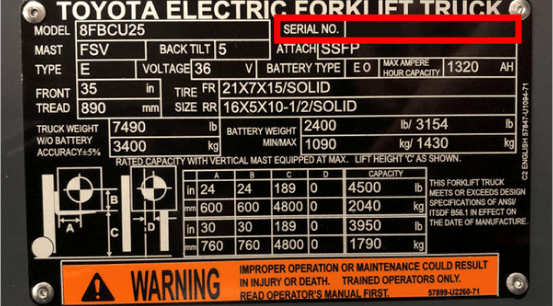Addressing Common Electric Forklift Misunderstandings

While their use is rising in popularity, many common misunderstandings still surround electric forklifts. Electric forklifts are low-emission vehicles powered by an electric battery that also serves as the counterweight. Toyota Electric Forklifts can utilize either lead-acid or lithium-ion batteries, depending on the need of the buyer.
If you open yourself up to the idea of utilizing electric forklifts, you can see how the following misconceptions are easily dismissed.
Electric Forklift Misunderstandings
Electric forklifts don’t offer the same performance as an internal combustion engine forklift.
One of the most common misconceptions associated with electric forklifts is that they do not provide the same high-level performance as internal combustion (IC) engine forklifts. However, specific electric models are made to operate with similar performance to internal combustion forklifts.
High voltage electric models are equipped to perform comparably to their IC counterparts. Higher voltage translates to more power, meaning you can benefit from increased travel, lift, and acceleration speeds. Built with a lift capacity ranging from 4,000-11,000 lbs., the Toyota 80V Pneumatic forklift has the strength, speed, durability, and reliability needed to perform in tough environments such as concrete and oil and gas, while minimizing emissions.
Cost of operating and maintaining the equipment is too expensive.
Another misunderstanding about these lifts is that operation and maintenance costs are too extravagant. In addition, some view the upfront cost of the forklift battery to be too costly.
However, over time they require less maintenance due to having fewer components than their IC counterparts. These lifts can also have a longer lifespan, allowing owners to maintain and use their forklift for longer periods of time.
To maintain an IC forklift, items such as filters and oil will need to be replaced with use. However, electric forklifts do not have these components, which can reduce maintenance and labor costs. Electricity also typically costs less per kilowatt-hour to operate, resulting in a reduced cost of operation. This can lead to significant ROI for your business.
Electric forklifts cannot operate outdoors.
The misunderstanding that electric forklifts cannot operate outdoors may stop many businesses from purchasing them. Many industries, including construction, general manufacturing, and block and pipe, need forklifts to work outside while carrying heavy loads.
Toyota produces specific forklift models that can operate indoors and outdoors, like the 80V Pneumatic Forklift. It offers low-maintenance and low emissions while supporting rugged, outdoor, traditionally IC applications.
Electric forklifts cannot lift as much as internal combustion forklifts.
Not only is this incorrect, but it can hinder buyers from converting their fleet from IC to electric. Toyota electric forklifts have a lift capacity of up to 40,000 lbs. And they are designed and tested to safely lift their maximum capacity to a designated lift height, similar to their IC counterparts.
Electric forklifts continue to grow in popularity and are being utilized in a variety of industries. Your local, authorized Toyota Forklift dealer can help you learn more as well as help direct your first steps into converting your fleet.


